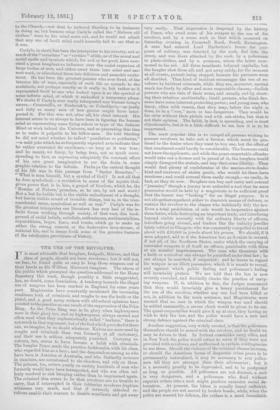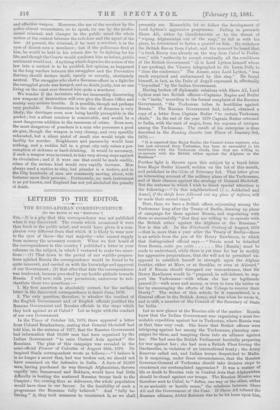THE USE OF THE REVOLVER.
IT is most advisable that burglars, footpads, thieves, and that class of people, should not have revolvers ; but it will not, we fear, be found quite so easy to keep those weapons out of their hands as Sir William Harcourt imagines. The alarm of the public which prompted the question addressed to the Home Secretary this week, though possibly a little exaggerated, has, no doubt, some foundation. A tendency towards the illegal use of weapons has been marked in England for some years past. Magistrates have constantly mentioned the increasing readiness both of criminals and roughs to use the knife or the pistol, and a good many writers with old-school opinions have pointed to the practice as one result of the suppression of the Prize Ring. As the Prize Ring was in its glory when highwaymen were in their glory too, and as highwaymen always carried and often used what they euphemistically called " barkers," there is not much in that argument; but of the fact which provoked it there can, we imagine, be no doubt whatever. Knives are more used by roughs and criminals than was formerly at all customary, and their use is seldom adequately punished. Carrying re- volvers, too, seems to have become a habit with criminals. The burglar Peace made the practice fashionable with his class, who regarded him as a hero ; and the desperadoes among us who have been in America or Australia, and who distinctly increase in numbers, are accustomed to six-shooters, and rely on them. The prisons, too, return yearly on society hundreds of men who formerly would have been transported, and who are often sul- lenly resolved to risk hanging rather than be imprisoned again. The criminal idea seems to be that revolvers are no trouble to carry, that if interrupted in their robberies revolvers frighten witnesses very much, and that if seriously attacked re- volvers enable their wearers to disable assailants and get away
very easily. That impression is deepened by the history of Peace, who owed sonic of his escapes to the use of his revolver, and by a scene such as that which occurred on Saturday evening in Cromwell Road, South Kensington. A man had entered Lord. Harherton's house for pur- poses of robbery, was detected by the cook, fled into the street, and was there attacked by the cook, by a policeman in plain-clothes, and by a postman, whom the latter sum- moned to his aid. All three assailants behaved capitally, but the burglar shot them all, and got away safely, for the moment at all events, pursuit being stopped because his pursuers were all disabled. That kind of incident encourages the use of re- volvers by habitual criminals, while they are, moreover, carried much too freely by other and more respectable classes,—foolish persons who are vain of their arms, and usually cud by shoot- ing their relatives accidentally ; timid persons, who think fire- arms have some inherent protecting power ; and young men, who fancy, often with reason, that they may, before the night is done, be in a " row," mono or less dangerous. They would be far safer without their pistols and with oak-sticks, but that is not their opinion. The habit, in fact, is spreading, and is most objectionable, but it is a little difficult to see how it is to be suppressed.
The most popular idea is to compel all persons wishing to possess revolvers to take out a licence, which must be pro- duced. to the dealer when they want to buy one, but the effect of that enactment could hardly be considerable. The licensers could not know the applicants, and while the quasi respectable offender would take out a licence and be proud of it, the burglars would simply disregard the statute, and buy their arms illicitly. They would find plenty of confederates of the marine-store-dealer
kind and receivers of stolen goods, who would let them have revolvers ; and could conceal them easily enough,—as easily, in fact, as they do now. Burglars can buy and carry and conceal " jemmies," though a jemmy is so unlawful a tool that its mere possession would be held by a magistrate to be sufficient proof that the bearer was "lurking " for an illegal purpose. It is not altogether expedient either to diminish means of defence, or restrict the revolver to the classes who habitually defy the law. Even a total prohibition of sale would be inoperative against these latter, while destroying an important trade, and interfering beyond visible necessity with the ordinary liberty of officers, travellers going abroad, and traders like the unlucky jeweller lately robbed iu Glasgow, who was constantly compelled to travel about with £10,000 in jewels about his person. We should, if it were adopted, add to it the American law, as it exists in several, if not all, of the Northern States, under which the carrying of concealed weapons is of itself an offeuce, punishable with three or six months' imprisonment. The man who threatens with a knife or a revolver can always be punished under that law ; he can always be searched, if suspected ; and he learns to regard his weapon as an illicit possession, which it is unsafe to reveal, and against which public feeling mid policeman's feeling will invariably protest. We are told that the law is now severely executed, and decidedly checks the practice of carry- ing weapons. If, iu addition to this, the Judges announced that they would. invariably give a heavy punishment for the use of the revolver, whether any one had been killed or not, iu addition to the main sentence, and Magistrates were warned that no case in which the weapon was used should be settled summarily, a severe check would be given to its use. The quasi-respectables would give it up at once, they having no wish to defy the law, and the police would have a new and strong defence against the criminal class.
Another suggestion, very widely mooted, is that the policemen themselves should be armed with the revolver, and no doubt we may be driven to that. In Ireland constables carry rifles, and in New York the police would refuse to servo if they were not provided. with revolvers, and authorised in certain contingencies to use them. Should. the violence of the criminal classes increase, or should the American forms of desperate crime prove to be permanently naturalised, it may be necessary to arm police- men till they aro stronger than their adversaries ; but it is a necessity greatly to be deprecated, and to be postponed as long as possible. All policemen are not discreet, a mob is very dangerous, and a policeman who fired. without superior orders into a mob might produce excessive social de- testation. At present, the baton is usually found sufficient, and the people are not moved by broken heads; while, when the police are massed for defence, the cutlass is a most formidable
and effective weapon. Moreover, the use of the revolver by the police almost necessitates, so to speak, its use by the profes- sional criminal, and changes in the public mind the whole notion of the contest between the evil-doer and the agent of the law. At present, the criminal, if he 'uses a revolver, is in the eyes of decent men a murderer ; but if the policeman fired at him, he would be held in his return fire to be fighting for his life, and though the Courts would condemn him as before, public sentiment would not. Anything which degrades the action of the law into a contest is to be avoided, lest opinion, as happened in the long warfare between the smugglers and the Preventive Service, should declare itself, openly or covertly, obstinately neutral. The smuggler who shot a Revenue-officer in a fight for the smuggled goods was hanged, and no doubt justly, but no one living on the coast ever deemed him quite a murderer.
We wonder if the inventors who are incessantly discovering new weapons of destruction will ever give the Home Office and society very serious trouble. It is possible, though not perhaps very probable. No diminution in the size of firearms is very likely, the derringer even now being hardly perceptible in the pocket ; but a silent revolver is conceivable, and would be a most dangerous addition to the resources of crime. Even now, the most dangerous of poachers is a man who possesses a good air-gun, though the weapon is very clumsy, and very speedily exhausted, but a silent pistol of small size would triple the facility for murder. Neighbours and passers-by would hear nothing, and a sudden fall in a great city only raises a pre- sumption of sickness or hard-drinking. It would be necessary, if such a weapon were invented, to take very strong steps against its circulation ; and if it were one that could be made readily, crime of the serious kind would very rapidly increase. Men always need a motive to slay, but plunder is a motive, and in the City hundreds of men are constantly moving about, with fortunes upon their persons. Fortunately, no such instrument is as yet known, and England has not yet abolished. the penalty of death.



































 Previous page
Previous page